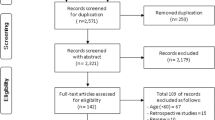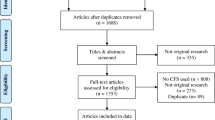Abstract
Background
Anticholinergic (AC) drugs are associated with significant impairment in cognitive and physical function which may affect rehabilitation in older people. We aimed to evaluate whether AC burden is associated with rehabilitation achievement in post-acute hip-fractured patients.
Methods
A retrospective cohort study carried out in a post-acute geriatric rehabilitation center on 1019 hip-fractured patients admitted from January 2011 to October 2015. The Anticholinergic Cognitive Burden Scale (ACB) was used to quantify the AC burden. Main outcome measures included the Functional Independence Measure (FIM) instrument, motor FIM (mFIM), Montebello Rehabilitation Factor Score (MRFS) on the mFIM, and length of stay (LOS). The study population was divided into two groups: individuals with low admission AC burden (ACB ≤ 1) and those with high admission AC burden (ACB ≥ 2). The relationship between the admission AC burden and clinical, demographic and comorbidity variables was assessed using the Mann–Whitney and Chi square tests. A multiple linear regression model was used to estimate the association between admission AC burden and discharge FIM score after controlling for sociodemographic characteristics and chronic diseases.
Results
Patients with a high admission AC burden had a significantly higher rate of high education, a significantly lower rate reside at home, they waited a longer period of time from surgery to rehabilitation, were less independent pre-fracture, and presented with a higher rate of vascular disorders and depression compared with patients with a lower admission AC burden. These patients also exhibited a significantly lower FIM score on admission and at discharge, a lower FIM score change, and a lower achievement on the MRFS compared with patients with a lower admission AC burden. A multiple linear regression analysis showed that admission AC burden was significantly associated with the discharge FIM score after adjustment for confounding variables.
Conclusion
High admission AC drug burden is significantly associated with less favorable discharge functional status in post-acute hip-fractured patients, independent of relevant risk factors.

Similar content being viewed by others
References
Bostock CV, Soiza RL, Mangoni AA. Association between prescribing of antimuscarinic drugs and antimuscarinic adverse effects in older people. Expert Rev Clin Pharmacol. 2010;3:441–52.
Gerretsen P, Pollock BG. Drugs with anticholinergic properties: a current perspective on use and safety. Expert Opin Drug Saf. 2011;10:751–65.
American Geriatrics Society 2015 Beers Criteria Update Expert Panel. American Geriatrics Society updated beers criteria for potentially inappropriate medication use in older adults. J Am Geriatr Soc. 2015;63:2227–46.
Sumukadas D, McMurdo ME, Mangoni AA, et al. Temporal trends in anticholinergic medication prescription in older people: repeated cross-sectional analysis of population prescribing data. Age Ageing. 2014;43:515–21.
Salahudeen MS, Hilmer SN, Nishtala PS. Comparison of anticholinergic risk scales and associations with adverse health outcomes in older people. J Am Geriatr Soc. 2015;63:85–90.
Landi F, Russo A, Liperoti R, et al. Anticholinergic drugs and physical function among frail elderly population. Clin Pharmacol Ther. 2007;81:235–41.
Aizenberg D, Sigler M, Weizman A, et al. Anticholinergic burden and the risk of falls among elderly psychiatric inpatients: a 4-year case-control study. Int Psychogeriatr. 2002;14:307–10.
Collamati A, Martone AM, Poscia A, et al. Anticholinergic drugs and negative outcomes in the older population: from biological plausibility to clinical evidence. Aging Clin Exp Res. 2016;28:25–35.
Salahudeen MS, Duffull SB, Nishtala PS. Anticholinergic burden quantified by anticholinergic risk scales and adverse outcomes in older people: a systematic review. BMC Geriatr. 2015;15:31.
Koshoedo S, Soiza RL, Purkayastha R, et al. Anticholinergic drugs and functional outcomes in older patients undergoing orthopaedic rehabilitation. Am J Geriatr Pharmacother. 2012;10:251–7.
Mahoney FI, Barthel DW. Functional evaluation: the Barthel Index. Md State Med J. 1965;14:61–5.
Lowry E, Woodman RJ, Soiza RL, et al. Associations between the anticholinergic risk scale score and physical function: potential implications for adverse outcomes in older hospitalized patients. J Am Med Dir Assoc. 2011;12:565–72.
Pasina L, Djade CD, Lucca U, et al. Association of anticholinergic burden with cognitive and functional status in a cohort of hospitalized elderly: comparison of the anticholinergic cognitive burden scale and anticholinergic risk scale: results from the REPOSI study. Drugs Aging. 2013;30:103–12.
Kolanowski A, Mogle J, Fick DM, et al. Anticholinergic exposure during rehabilitation: cognitive and physical function outcomes in patients with delirium superimposed on dementia. Am J Geriatr Psychiatry. 2015;23:1250–8.
Hamilton BB, Granger CV, Sherwin FS, et al. A uniform national data system for medical rehabilitation. In: Fuhrer MJ, editor. Rehabilitation outcomes: analysis and measurement. Buffalo: Brookes Publishing Co.; 1987. p. 137–47.
Folstein MF, Folstein SE, McHuge PR. “Mini-Mental state”. A practical method for grading the cognitive state of patients for the clinician. J Psychiatr Res. 1975;12:189–98.
Rolland Y, Pillard F, Lauwers-Cances V, et al. Rehabilitation outcome of elderly patients with hip fracture and cognitive impairment. Disabil Rehabil. 2004;26:425–31.
Heruti RJ, Lusky A, Barell V, et al. Cognitive status at admission: does it affect the rehabilitation outcome of elderly patients with hip fracture? Arch Phys Med Rehabil. 1999;80:432–6.
Koh GC, Chen CH, Petrella R, et al. Rehabilitation impact indices and their independent predictors: a systematic review. BMJ Open. 2013;3:e003483.
Boustani M, Campbell N, Munger S, et al. Impact of anticholinergics on the aging brain: a review and practical application. Aging Health. 2008;4:311–20.
http://www.agingbraincare.org/uploads/products/ACB_scale-legal_size.pdf. Accessed 10 Feb 2018.
Bostock CV, Soiza RL, Mangoni AA. Associations between different measures of anticholinergic drug exposure and Barthel Index in older hospitalized patients. Ther Adv Drug Saf. 2013;4:235–45.
Hershkovitz A, Kalandariov Z, Hermush V, et al. Factors affecting short-term rehabilitation outcomes of disabled elderly patients with proximal hip fracture. Arch Phys Med Rehabil. 2007;88:916–21.
Hershkovitz A, Jacubovski OS, Alima Bot M, et al. Clock drawing and rehabilitation outcome in hip fracture patients. Disabil Rehabil. 2010;32:2113–7.
Kachru N, Carnahan RM, Johnson ML, et al. Potentially inappropriate anticholinergic medication use in community-dwelling older adults: a national cross-sectional study. Drugs Aging. 2015;32:379–89.
Beaupre LA, Binder EF, Cameron ID, et al. Maximising functional recovery following hip fracture in frail seniors. Best Pract Res Clin Rheumatol. 2013;27:771–88.
Munson JC, Bynum JPW, Bell JE, et al. Patterns of prescription drug use before and after fragility fracture. JAMA Intern Med. 2016;176:1531–8.
Salahudeen MS, Duffull SB, Nishtala PS. Impact of anticholinergic discontinuation on cognitive outcomes in older people: a systematic review. Drugs Aging. 2014;31:185–92.
Acknowledgments
The authors would like to thank Mrs. Phyllis Curchack Kornspan for her editorial services, and Ilana Gilarentel (Tel Aviv University) for her statistical support.
Author information
Authors and Affiliations
Contributions
Avital Hershkovitz initiated the study, helped write the manuscript, and was involved in data collection and review of the literature. Corina Angel was involved with data collection and helped review the literature. Shai Brill assisted in editing the manuscript and reviewing the literature. Ran Nissan helped write the manuscript and review the literature, and was involved in data collection.
Corresponding author
Ethics declarations
Conflicts of interest
Avital Hershkovitz, Corina Angel (deceased), Shai Brill, and Ran Nissan have no conflicts of interest relevant to the content of this study.
Ethical approval
The ‘Beit Rivka’ Geriatric Medical Center Institutional Review Board (#7388) approved this study.
Funding
No sources of funding were used to assist in the conduct of this study.
Rights and permissions
About this article
Cite this article
Hershkovitz, A., Angel, C., Brill, S. et al. The Association between Anticholinergic Drug Use and Rehabilitation Outcome in Post-Acute Hip Fractured Patients: A Retrospective Cohort Study. Drugs Aging 35, 333–341 (2018). https://doi.org/10.1007/s40266-018-0533-7
Published:
Issue Date:
DOI: https://doi.org/10.1007/s40266-018-0533-7




